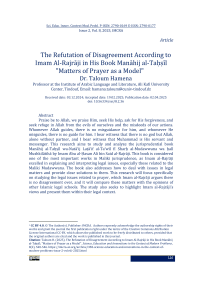The Refutation of Disagreement According to Imam Al-Rajrāji in His Book Manāhij al-Taḥṣīl; "Matters of Prayer as a Model"
Автор: Taloum H.
Журнал: Science, Education and Innovations in the Context of Modern Problems @imcra
Статья в выпуске: 2 vol.8, 2025 года.
Бесплатный доступ
Praise be to Allah, we praise Him, seek His help, ask for His forgiveness, and seek refuge in Allah from the evils of ourselves and the misdeeds of our actions. Whomever Allah guides, there is no misguidance for him, and whomever He misguides, there is no guide for him. I bear witness that there is no god but Allah, alone without partner, and I bear witness that Muhammad is His servant and messenger. This research aims to study and analyze the jurisprudential book Manāhij al-Taḥṣīl wa-Natāʾij Laṭāʾif al-Ta’wīl fī Sharḥ al-Mudawwana wa ḥall Mushkilātihā by Imam Abu al-Ḥasan Ali bin Said al-Rajrāji. This book is considered one of the most important works in Maliki jurisprudence, as Imam al-Rajrāji excelled in explaining and interpreting legal issues, especially those related to the Maliki Mudawwana. The book also addresses how to deal with issues in legal matters and provide clear solutions to them. This research will focus specifically on studying the legal issues related to prayer, which Imam al-Rajrāji argues there is no disagreement over, and it will compare these matters with the opinions of other Islamic legal schools. The study also seeks to highlight Imam al-Rajrāji’s views and present them within their legal context.
Короткий адрес: https://sciup.org/16010427
IDR: 16010427 | DOI: 10.56334/sei/8.2.36
Текст научной статьи The Refutation of Disagreement According to Imam Al-Rajrāji in His Book Manāhij al-Taḥṣīl; "Matters of Prayer as a Model"
Allah (SWT) sent His Prophet as a guide and mercy to the worlds, and He clarified in the Quran and the Sunnah what Muslims need in terms of guidance and rules for worship and transactions. After the death of the Prophet Muhammad (PBUH), scholars took it upon themselves to interpret the legal texts and engage in ijtihad (independent reasoning) for new issues based on their deep understanding of the texts. Among these scholars who had a significant impact on the Maliki school was Imam Abu al-Ḥasan Ali bin Said al-Rajrāji, whose book Manāhij al-Taḥṣīl wa-Natāʾij Laṭāʾif al-Ta’wīl is considered one of the most important jurisprudential sources in this school. Therefore, this research aims to specifically study this book, focusing on the issues in the chapter on prayer where Imam al-Rajrāji asserts there is no disagreement, and to examine the views of other Maliki jurists and scholars from other schools on these issues.
Reasons for Choosing the Research:
This topic was chosen due to the significance of the book written by Imam al-Rajrāji in clarifying the issues of Maliki jurisprudence and resolving its problems. Additionally, his scholarly status within the school and the fact that the book still requires broader study to encompass all aspects of his contributions to explanation and legal rulings made it an important subject for research.
Research Problem:
The research problem lies in the lack of sufficient study on this book, especially concerning Imam al-Rajrāji’s refutation of disagreements in some legal issues. Therefore, the research poses the question: “Is Imam al-Rajrāji’s assertion of the lack of disagreement in certain issues truly substantiated?” and “What is Imam al-Rajrāji’s standing within the Maliki school?”
Previous Studies:
It can be said that this topic has not been sufficiently studied, apart from some works that either focus on the book’s verification or clarify the methodology of Imam al-Rajrāji. This book attempts to systematically review the issues of
Sci. Educ. Innov. Context Mod. Probl. P-ISSN: 2790-0169 E-ISSN: 2790-0177 Issue 2, Vol. 8, 2025, IMCRA prayer where Imam al-Rajrāji denies any disagreement within the chapter on prayer, then study them to confirm or refute the disagreement, based on the statements of the Maliki jurists. The study will also assess whether the refutation of disagreement is internal to the Maliki school or extends to the four Sunni schools of thought when the disagreement is external to the school.
Methodology Adopted in the Research:
The research will employ four methodologies to address the research problem:
-
1. The Historical Approach: This approach will trace the evolution of
-
2. The Comparative Approach: This approach will allow for a
-
3. The Analytical Approach: This involves analyzing Imam al-Rajrāji’s
-
4. The Inductive and Deductive Approach: This will enable the
the study of Maliki jurisprudence books and how the book was marginalized in certain periods, leading to renewed interest in it.
comparison between Imam al-Rajrāji’s views and those of other Maliki jurists to assess the validity of his stance on denying disagreement in specific issues, as well as to determine whether other jurists support or oppose his position.
texts and studying his status among Maliki jurists through reviewing his works and the responses to them. This will help determine his influence and impact on the Maliki school.
extraction of jurisprudential and legal rules based on the analysis of Imam al-Rajrāji’s legal texts, alongside the opinions of other jurists about his views. This approach will allow for interpreting and analyzing the legal conclusions resulting from his works, based on an examination of the practical cases in the jurisprudential texts and their applications.
Research Sections:
Chapter One: Introduction to Imam Abu al-Ḥasan Ali bin Said al-Rajrāji
Chapter Two: Study of the Book and Clarification of Key Concepts
Chapter Three: Practical Study of Jurisprudential Issues
Sci. Educ. Innov. Context Mod. Probl. P-ISSN: 2790-0169 E-ISSN: 2790-0177 Issue 2, Vol. 8, 2025, IMCRA
Conclusion: Summary of Key Recommendations and Findings from the Research Across Its Various Sections


